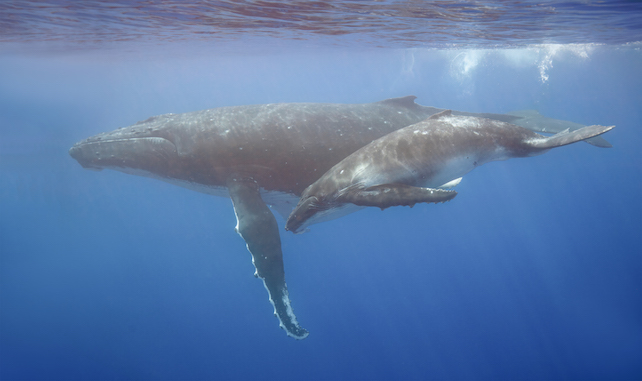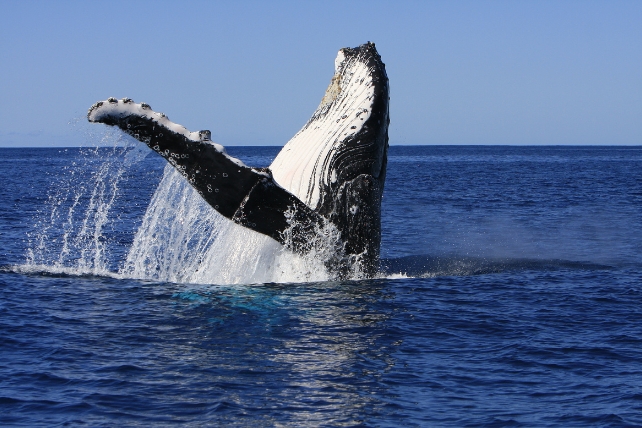
[ad_1]
Two new research have discovered eerily human-like sophistication in whale songs, difficult notions about our exceptionality and probably shedding mild on the evolution of language.
Some whales can match and even surpass the effectivity of our speech, one of many research discovered, with humpback whales (Megaptera novaeangliae) offering the closest competitors.
Within the second research, researchers report that humpback songs adhere to a statistical construction thought of an indicator of human language.
“These findings problem long-held assumptions concerning the uniqueness of human language, uncovering deep commonalities between evolutionarily distant species,” says Simon Kirby, professor of language evolution on the College of Edinburgh.
Apart from impressing and humbling us, the whales’ talents may assist us higher perceive the language of different animals and our personal. A rising physique of analysis suggests numerous species have intricate communication techniques, and plenty of exhibit qualities as soon as deemed uniquely human.
Within the effectivity paper, ethologist and computational scientist Mason Youngblood from Stony Brook College used a pair of linguistic legal guidelines to look at the effectivity of 51 human languages and 65,511 whale-song sequences.
Pure choice favors environment friendly communication, Youngblood notes, which helps people share very important info shortly and easily.
Complicated indicators can convey extra, he acknowledges, and redundancy helps guarantee correct transmission, however these advantages aren’t free. Prattling takes useful time and vitality, and will entice predators.
To quantify the effectivity of human and whale communication, Youngblood used two linguistic rules: Menzerath’s legislation and Zipf’s legislation of abbreviation.
In response to Menzerath’s legislation, effectivity will increase when longer sequences like phrases, sentences, or songs encompass shorter parts, like phrases, phonemes, or notes, Youngblood explains.
Per Zipf’s legislation of abbreviation, a communication system is extra environment friendly if incessantly used parts – like phrases, phonemes, and notes – are shorter.
Youngblood utilized each legal guidelines to vocalization sequences from 16 cetacean species, together with baleen whales in addition to dolphins and different toothed whales. For comparability, he additionally assessed 51 human languages.
Calls from 11 of 16 species exhibited Menzerath’s legislation as a lot or greater than human speech.
The exceptions had been orcas (Orcinus orca), Hector’s dolphins (Cephalorhynchus hectori), Commerson’s dolphins (Cephalorhynchus commersonii), Heaviside’s dolphins (Cephalorhynchus heavisidii), and North Pacific proper whales (Eubalaena japonica).
Most species did not show Zipf’s legislation of abbreviation, Youngblood experiences. It appeared simply in humpback and blue whales (Balaenoptera musculus), with solely humpbacks rivaling humanity’s embrace of the legislation.

For the second research, researchers centered on humpback whale songs, making use of quantitative strategies historically used to judge speech in human infants.
Earlier analysis has recognized a selected attribute of human language that appears to assist studying and promote language preservation. Structurally coherent items of a language show a frequency distribution ruled by an influence legislation known as a Zipfian distribution.
This appears to assist infants study a language extra simply, the researchers on the brand new research word, and “probably enhances the correct preservation of language throughout generations.”
Humpback songs are equally complicated, usually arising from nested hierarchical elements. For instance the whales create phrases utilizing particular person sound parts, then repeat phrases to kind themes, and put themes collectively to construct songs.
Humpbacks additionally cross on songs culturally, as we do with language. If the statistical properties of human languages advanced for smoother cultural transmission, the authors say, then related indicators ought to seem in whale songs.
To check that concept, they analyzed eight years of humpback recordings with speech-segmentation strategies designed to be used with human infants.
Humpback whale songs have the identical statistical construction as human language, providing a glimpse into the origins of complicated communication.
Study extra: https://t.co/kXkRUS5Fnq pic.twitter.com/hWfADXo0Jn
— Information from Science (@NewsfromScience) February 13, 2025
This revealed hidden construction within the songs, together with statistically coherent subsequences whose frequency adopted a Zipfian distribution – traits present in all human languages.
The subsequence lengths additionally adhere to Zipf’s legislation of brevity, the researchers add, which states extra incessantly used linguistic items are typically shorter.
“Utilizing insights and strategies from how infants study language allowed us to find beforehand undetected construction in whale tune,” says first creator Inbal Arnon, a developmental psycholinguist at Hebrew College of Jerusalem.

Discovering this hidden, “language-like” construction was a shock, provides behavioral ecologist Ellen Garland from the College of St. Andrews. Whale songs lack the semantic that means of language, she explains, and could also be extra akin to human music.
Nonetheless, Garland says this discovery “strongly suggests this cultural habits holds essential perception into the evolution of complicated communication throughout the animal kingdom.”
The research had been revealed in Science Advances and Science.
[ad_2]